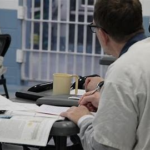The current law that governs a juvenile’s capacity to proceed in a delinquency matter matches part of the criminal law that governs a defendant’s capacity to proceed. The Juvenile Code expressly incorporates G.S. 15A‑1001, ‑1002, and ‑1003—the criminal provisions that establish a capacity standard and establish procedure to raise and determine capacity to proceed. G.S. 7B-2401. The criminal provisions that address safeguarding the defendant to return for trial should the defendant subsequently become capable of proceeding and return of the defendant for trial upon gaining capacity are notably absent from the Juvenile Code.
Beginning with offenses committed on January 1, 2025, the Juvenile Code will contain new laws, different from the criminal law, that establish a juvenile capacity standard, establish procedures to raise and determine capacity, and create new procedures for remediation of incapacity. This blog summarizes the new juvenile capacity standard and outlines the procedure to raise and determine capacity under the new law. More information on criminal procedure related to capacity to proceed can be found at https://benchbook.sog.unc.edu/criminal/capacity-proceed.
The new law includes the following provisions.
- Raising Capacity
The question of the juvenile’s capacity to proceed can be raised at any time. As is the case under current law, the prosecutor, the juvenile, the juvenile’s attorney, or the court can raise the question of capacity at any time during a delinquency proceeding. G.S. 7B-2401.2(a). The moving party must submit a motion detailing the specific conduct leading them to question the juvenile’s capacity.
If the juvenile is under the age of 12, the court must ask the prosecutor and the juvenile’s attorney about the juvenile’s capacity to proceed the first time the juvenile appears in court. G.S. 7B-2401.2(f). The prosecutor and the attorney for the juvenile can request additional time to determine if they need to question the juvenile’s capacity to proceed. If that request is made, the court must allow the question of capacity to be raised at any time during the proceedings.
The new juvenile capacity standard and procedure does not apply in mandatory transfer cases. Cases that are subject to mandatory transfer as the result of a returned indictment are excluded from the new law. G.S. 7B-2401(c). This includes cases in which a Class A felony is alleged to have been committed at age 13, 14, or 15 and cases in which a Class F or G felony is alleged to have been committed at age 16 or 17. G.S. 7B-2200, -2200.5. In these cases, the question of capacity can only be raised after the case is transferred to superior court for trial as an adult. Cases in which the court did not obtain jurisdiction until the juvenile aged out of juvenile jurisdiction are also excluded from the juvenile capacity standard. G.S. 7B-2401(c). The Juvenile Code limits the court’s authority in these cases to either transfer or dismiss them. G.S. 7B-1601(d), (d1). The issue of capacity to proceed can also only be raised in these matters after transfer to superior court.
- A New Juvenile Capacity Standard
The juvenile capacity standard has two components. The juvenile must 1) lack a certain prescribed ability 2) as the result of certain statutorily delineated reasons.
Necessary Abilities
The abilities that the juvenile must possess are the same abilities that an adult must possess in order to have capacity to proceed in a criminal matter. These abilities are rooted in the holding in Dusky v. United States, 362 U.S. 402 (1960) (per curiam) and include the juvenile’s ability to
- understand the nature and object of the proceedings,
- comprehend their own situation in reference to the proceeding, and
- assist in their defense in a rational or reasonable manner. G.S. 7B-2401(a).
All three of these abilities are required for a juvenile to have capacity to proceed. However, an absence of an ability is not sufficient to find that the juvenile lacks capacity to proceed. The absence of that ability (or abilities) must be the result of one of the statutory reasons.
Statutory Reasons for the Absence of a Required Ability
The language in the new law departs from the criminal law in this part of the capacity standard. Under the criminal law, a person must lack one of the necessary abilities as the result of mental illness or defect in order to lack capacity to proceed. G.S. 15A-1001(a). The juvenile capacity standard provides that a juvenile lacks capacity to proceed when they do not have one of the required abilities as the result of
- mental disorder,
- intellectual disability,
- neurological disorder,
- traumatic or acquired brain injury, or
- developmental immaturity. G.S. 7B-2401.
Developmental Immaturity Defined
Developmental immaturity is defined as “[i]ncomplete development or delay associated with chronological age, which manifests as a functional limitation in one or more domains, including cognitive, emotional, and social development.” G.S. 7B-2401.1(1). The concept of including developmental immaturity as a basis for juvenile incapacity was described by Dr. Kimberly Larson and Dr. Thomas Grisso in 2011 in Developing statutes for competence to stand trial in juvenile delinquency proceedings: A guide for lawmakers. As explained by Larson and Grisso, research has shown that the cognitive and social characteristics of adolescence have the potential to impair the abilities that are necessary to have the capacity to proceed in ways that are as serious as the impairments that can be caused by mental disorders. The addition of developmental immaturity into the Juvenile Code means that if a juvenile lacks one of the necessary abilities because of their developmental immaturity, they will be found to lack capacity to proceed.
- Juvenile Forensic Evaluations
Procedure
The court is allowed to appoint one or more forensic evaluators when the juvenile’s capacity to proceed is questioned. G.S. 7B-2401.2(b). The forensic evaluator must meet new minimum standards to conduct juvenile forensic evaluations. G.S. 7B-2401.3. Those standards and a credentialing body to oversee them are currently being established by the Department of Health and Human Services as required by G.S. 7B-2401.3(a). Qualified professionals who have been conducting juvenile forensic evaluations before this legislation was enacted are deemed to possess the minimum requirements to become an evaluator and they have 12 months to satisfy the new standards once they are adopted. G.S. 7B-2401.3(b).
A juvenile forensic evaluation is defined as “a full examination by a forensic evaluator using evidence‑based psychological tools to determine if a juvenile has the capacity to proceed” and must include review of all the juvenile’s available prior mental health and educational records and IQ testing and it can include other developmentally appropriate testing that the evaluator deems relevant. G.S. 7B-2401.1(3).
A court ordered forensic evaluation must be conducted in the least restrictive environment considering the best interests of the juvenile and public safety. G.S. 7B-2401.2(j). If the allegations include that the juvenile committed an offense that would be a felony if committed by an adult and the court finds that an evaluation at a state facility would be more appropriate than a community-based evaluation, the court can order the juvenile to a state facility for an evaluation. G.S. 7B-2401.2(c).
An order for a forensic evaluation to determine capacity to proceed stays all juvenile proceedings except for hearings that might be needed to determine the need for continued nonsecure or secure custody. G.S. 7B-2401.2(g). The statute also provides that proceedings related to transfer via a returned indictment of offenses alleged to have been committed at age 16 and 17 are not stayed by an order of a forensic evaluation. However, because the juvenile capacity standard does not apply to these cases, it appears that an order for a forensic evaluation could not be issued prior to the transfer of the case.
Both the juvenile and the State retain the right to obtain their own experts when the court appoints a forensic evaluator. G.S. 7B-2401.2(b).
Content of Juvenile Forensic Evaluations
The forensic evaluator is required to consider
- Whether the juvenile is 1) capable to proceed, 2) incapable to proceed, or 3) incapable to proceed with an ability to attain capacity in the foreseeable future with remediation services;
- The basis of any incapacity (mental disorder, intellectual disability, neurological disorder, traumatic or acquired brain injury, or developmental immaturity); and
- The capacity of the juvenile to
- Appreciate the allegations,
- Appreciate the range and nature of allowable dispositions,
- Understand the roles of the participants and the adversary nature of the legal process,
- Disclose to counsel facts pertinent to the proceeding,
- Display appropriate courtroom behavior,
- Testify regarding the relevant issues,
- Make reasonable and rational decisions, and
- Assist in their defense in a rational manner.
- The evaluator can also consider any other factors that they deem relevant. S. 7B-2401.3(e).
The evaluator must provide a written report to the court with the findings from the evaluation. G.S. 7B-2401.1(4), -2401.2(e). If the evaluator believes the juvenile is incapable to proceed, their report must contain
- Any recommended treatment or education needed for the juvenile to attain capacity, if any;
- The likelihood that the juvenile will attain capacity in the foreseeable future because of recommended treatment or education;
- An assessment of the probable duration of treatment or education required to attain capacity; and
- If treatment is recommended, a recommendation as to the least restrictive environment in which services can be provided. S. 7B-2401.3(g).
Any statements made by a juvenile during their forensic evaluation regarding their responsibility for a criminal act that could result in an adjudication of delinquency or transfer to superior court for trial as an adult cannot be included in the report. G.S. 7B-2401.3(d). Any such statement is also not admissible in any juvenile or criminal proceeding against the juvenile. G.S. 7B-2401.3(d).
- Capacity Hearings
Once the question of a juvenile’s capacity to proceed is raised, the court must hold a hearing to determine whether the juvenile has capacity to proceed. G.S. 7B-2401.2(h). If the court orders a forensic evaluation, the hearing to determine capacity must be held when the court receives the evaluator’s report.
The juvenile bears the burden of proving by a preponderance of the evidence that they lack capacity to proceed. G.S. 7B-2401.2(h). The parties are allowed to stipulate that the juvenile is capable to proceed. The parties may not stipulate that the juvenile lacks capacity to proceed. Even if the parties agree that the juvenile lacks capacity to proceed, the court must hold a hearing and make that determination based on the evidence provided.
The prosecutor and the juvenile are allowed to call witnesses and present evidence at the capacity hearing. The court must issue an order regarding the juvenile’s capacity to proceed following the hearing. The order must contain findings of fact to support a determination of the juvenile’s capacity to proceed. G.S. 7B-2401.2(h).
Potential Outcomes
There are three potential outcomes from the capacity hearing.
- The court finds that the juvenile is capable to proceed.
The prosecution of the case can then continue, and the court must set a date for further juvenile proceedings. G.S. 7B-2401.2(h).
- The court determines that the juvenile is incapable and not likely to attain capacity in the foreseeable future.
If this occurs the court cannot transfer, adjudicate, or subject the juvenile to disposition (including on a probation violation). G.S. 7B-2401(a). The court is allowed to go forward with any motions that can be handled by counsel without the help of the juvenile. G.S. 7B-2401(b). The court must dismiss the petition. G.S. 7B-2401.5(b).
As long as the juvenile has not aged out of juvenile jurisdiction, the prosecutor is allowed to voluntarily dismiss any allegations with leave. G.S. 7B-2401.5(c). The statute does not specifically define how the prosecutor can proceed if the prosecutor subsequently believes that the juvenile gains capacity to proceed. However, G.S. 7B-2404 addresses this issue in the context of the prosecutor’s dismissal with leave because of a juvenile’s failure to appear. In that circumstance, the statute allows the prosecutor to refile the petition if the juvenile is apprehended or apprehension is imminent. Applying that structure to this statute, the prosecutor would be allowed to refile if they believe that the juvenile gains capacity to proceed.
While dismissal ends the delinquency proceeding, the court can conduct a hearing to determine if there are reasonable grounds to believe the juvenile meets criteria for involuntary commitment. If the court finds reasonable grounds to believe that the juvenile does meet those criteria, then an involuntary commitment case proceeds under Part 7 of Article 5 of Chapter 122C of the General Statutes. The delinquency case remains dismissed.
The court must direct the clerk to seal all forensic evaluations, remediation reports, and any other records pertaining to the juvenile’s capacity after the completion of all capacity hearings or after the juvenile is found not to be substantially likely to be restored or attain capacity in the foreseeable future. G.S. 7B-2401.5(d).
- The court finds that the juvenile is incapable to proceed and substantially likely to attain capacity in the foreseeable future.
Under these circumstances the court can order the juvenile to participate in remediation services. G.S. 7B-2401.4(b). Juvenile remediation does not currently exist and will be a new option once this law takes effect. Stay tuned for my October blog to learn more about what juvenile remediation is, how the new law requires it to operate, and how the remediation process will connect back to the court process in the delinquency case.
#Law #Juvenile #Capacity #Proceed #North #Carolina #Criminal #Law


![From Time Tracking To Invoicing: How TimeSolv Transforms Legal Practice [Sponsored]](https://namesit.xyz/wp-content/uploads/2024/09/Thumbnail-female_laywer_on_computer_using_LexisPlus-150x150.jpg)







